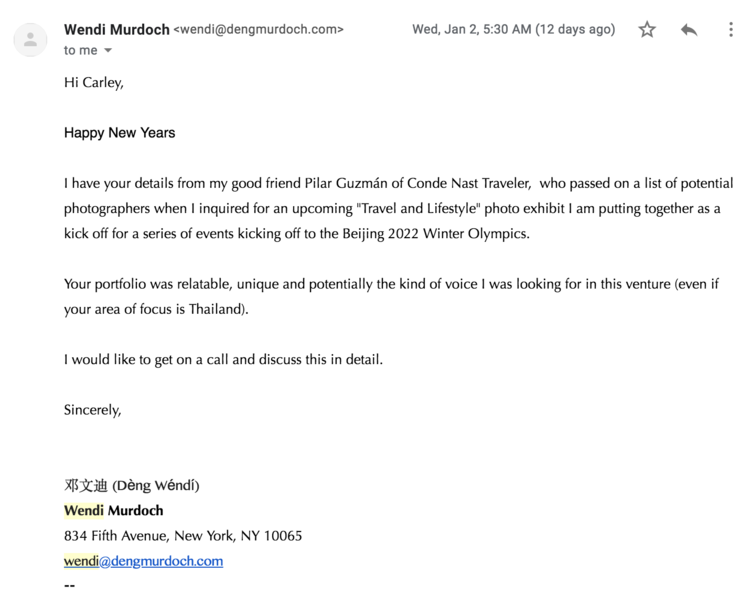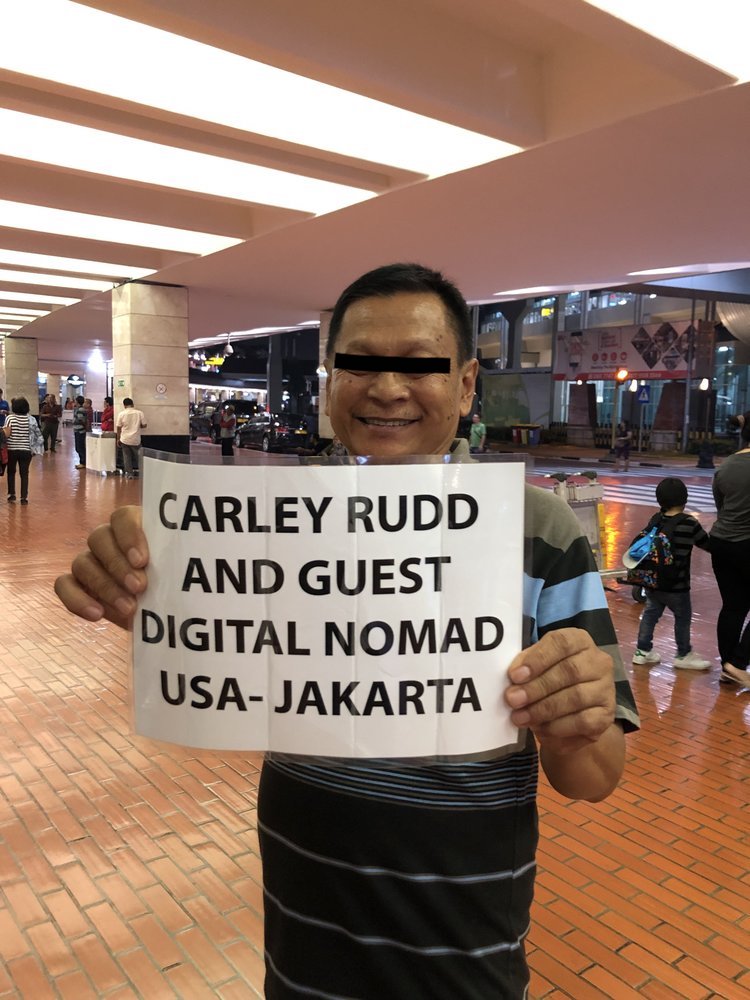Instagrammers Are Getting Scammed by a Mysterious ‘Con Queen’
Credit to Author: Nat Kassel| Date: Mon, 11 Feb 2019 19:58:11 +0000
Carley Rudd is a photographer from Maine with 60K Instagram followers. She’s a self-described “digital nomad,” meaning she’s self-employed, travels a lot, and occasionally plugs brands via social media in exchange for free stuff. She says it’s a gig that looks pretty glamourous from the outside but one that also involves a lot of “hustle” and “grind.”
She also says that it was precisely these factors that made her susceptible to being scammed out of almost US$16,000. Since then, she’s spoken to more than a hundred other Instagram photographers and influencers who got screwed in almost exactly the same way.
The scam began with an email from Wendi Deng Murdoch, a Chinese-American businesswoman who’s probably best known as the ex-wife of media mogul, Rupert Murdoch. In Carley’s case, it was a flattering email, describing her portfolio as “relatable, unique and potentially the kind of voice I was looking for in this venture.” The venture, as it turned out, was an offer for a well-paid photography assignment in a few different cities across Indonesia and Malaysia.

Carley was excited—it was a big opportunity to work with an established businesswoman and it could be great for her folio—so she promptly organised a phone call. Wendi and her assistant—a guy with a thick New York accent who introduced himself as Aaron Gersh—explained the project in detail and seemed to know a lot about Carley’s previous work with brands and travel publications. They spent hours on the phone together over the course of multiple days. Carley says it was the tiny details that really made the scam work.
“There was a point when I was on the phone with Wendi and she says, ‘Hold on just a minute,’” Carley explained. “I hear her put the phone down and I hear this muffled voice in the back that sounds like another woman’s voice. Wendi [was] speaking to her about some tutoring math project for her kids and then she gets back on the phone and says, ‘So sorry, I just had to speak to the nanny about this assignment for one of my daughters.’
“That’s pretty wild,” says Carley, “that they would go through that length to create that little scene.”
Within days, Carley booked flights to Jakarta. Aaron, Wendi’s assistant, was on the line while she made the booking, insisting that the travel budget was US$14,000 so she and her husband should fly business class. He explained that Carley could send her invoice through straight away and the money would be wire transferred back to them within two business days. Since it was a Friday though, she’d get to Jakarta before the money would come through.
When Carley and her husband were all ready to leave, they were told they’d have to pay $1,400 in cash for an expedited government photography permit, which seemed a little high, but not too outlandish. But once on the ground in Jakarta, things got dodgy pretty quickly—their driver took a long, indirect route from the airport and then handed off their $1,400 in a plastic bag to another man at a petrol station.

In the following days there were logistical problems with drivers, accusations from Aaron that they’d breached the NDA they’d signed and eventually they were asked to pay $800 cash to their driver for an overtime fee. Carley refused. That’s when things turned sour.
“They kind of bully you into thinking that you’re not good enough for the project. It’s almost like an emotional warfare,” says Carley. “She goes into this tangent about how I must not really want this job and I must just be this privileged white girl who doesn’t feel safe or comfortable travelling to Indonesia.”
This made Carley want to prove that she could handle herself, but ultimately it was just another ploy to keep her on the project and try to extract more money out of her. She refused to pay any more money and soon enough both Wendi and Aaron disappeared completely. Carley never heard from them again and never recovered the money.
“I felt embarrassed, I felt ashamed that this happened to me. I was pissed off that I lost a lot of money,” says Carley, explaining that she didn’t really want to publicly admit that she got scammed. But she soon decided that she should warn other potential victims, so she posted some Instagram stories and wrote a blog post detailing the whole thing. To her surprise, she was contacted by more than 100 other photographers and influencers who had been through pretty much the same thing.
Henry Wu and Zory Shahanksa, a couple of photographers from San Francisco who have around 80K Insta followers each, were sent an almost identical email by “Wendi.” Their experience turned out almost exactly the same as Carley’s: the scammers had intimate knowledge of their respective portfolios, they showered them with praise and offered a paid photography job in Indonesia.
While you’re here, check out a VICE documentary on credit card scammers:
When Wu and Shahanksa found themselves in Jakarta feeling suspicious about the project, Wu snapped a photo of their driver and his number plate. The next day the scammer called Wu in a rage, accusing him of being “racist” and “not in touch with [his] Asian side,” which was a particularly barbed comment as Wu is Taiwanese. This put the pair on the back foot, to the point where they agreed to pay another photography permit fee in cash to the driver. Wu says that this was a tactic: to accuse them of wrongdoing, prompting them to defend themselves, then to casually ask for more money. “It totally worked,” Wu later wrote in a blog post.
One of the strangest parts of the whole racket is that it doesn’t seem all that profitable. It’s true that scores of Instagrammers have blown large sums of money on last minute business class flights, but the scammer often only pocketed between $1,400 and $2,000 per scam. When you count up all the hours researching the victims, the time spent charming them on the phone, plus the driver’s cut, it seems a lot of work for a relatively small return. The tactic seems to be to scam a high volume of people for a few grand each, rather than taking a single person for everything.
According to K2 Intelligence, which is a private investigation agency currently working on the case, this particular scam is just the most recent incarnation of something much bigger. K2 Intelligence believes that a long string of scams, aimed at all kinds of demographics, from hairstylists to videographers to ex-military advisers, have been orchestrated by the same woman.
An investigation by the Hollywood Reporter in 2018 dubbed her “the con queen of Hollywood” and revealed that plenty of wealthy and powerful woman have been impersonated before Wendi Murdoch. Hollywood directors and CEOs including Stacey Snider, Sherry Lansing, Amy Pascal, Kathleen Kennedy and Lesli Linka Glatter have all been imitated for various scams, many which have involved victims taking trips to Asia.
And still, relatively little is known about this mysterious con queen. She’s never been caught on video and nobody seems to have any idea what she looks like. BuzzFeed News published a brief recording of “Wendi’s” assistant “Aaron” who some people believe are the same person, but it’s not a whole lot to go on. K2 Intelligence investigators suspect the woman is Asian, but it’s also been suggested that she has lived in the US and the UK. The one thing that everyone seems to agree on is that she’s incredibly talented at mimicry.
While money is certainly a motivator, Carley doesn’t think it’s all about the making bank. “I’ve talked with the investigator [Nicole Kotsianis] who’s working on the case… She seems to think it’s just this game for this person.” One photographer, who spoke to the Hollywood Reporter in 2018 under the promise of anonymity, claimed that he lost his life savings to the woman. His analysis: “No doubt that if the mystery is ever solved, we’ll learn she’s not only brilliant, but probably is some sort of sociopath.”
It seems that Instagram influencers are just the most recent target in a scam that runs much deeper. I ask Carley if she thinks Instagrammers are more susceptible to being scammed than other groups. “Certainly,” she says. “They know that as photographers, we’re hungry for work and I think they play off photographers like me in the industry that really want this type of job.”
“It is a lot harder than what we make it appear to be,” she explains, “We just kind of show our highlight reel on Instagram and not a lot of people see the behind-the-scenes and the grind and the hustle that goes into booking work.”
“I ended up out close to $16,000 at the end of it all. And that’s definitely a big blow to someone who’s a freelance photographer.”
Follow Nat on Twitter
This article originally appeared on VICE AU.